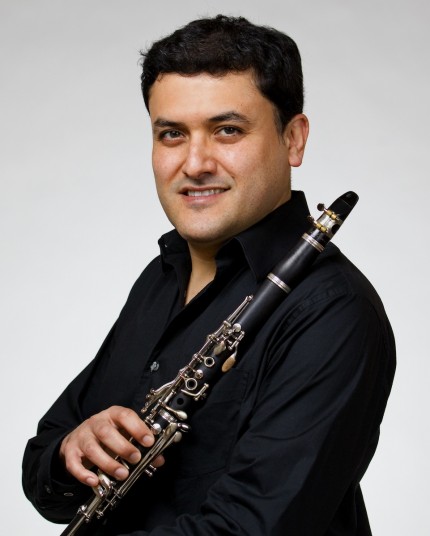Chicago Ensemble offers an engaging, wide-ranging program
Now in its 37th season, the Chicago Ensemble continues to present some of the most eclectic programs in the city. On Sunday, the group offered a characteristically generous and wide-ranging lineup at the University of Chicago’s International House in Hyde Park.
Five works for varied combinations of clarinet, violin and piano were in the offing Sunday. As always, the concert was enhanced by founder and pianist Gerald Rizzer’s informed yet informal introductions, as well as the ample spread of free preconcert and intermission treats.
The highlight of the afternoon was Brahms’ Clarinet Sonata No. 1 in F minor, one of several works written by Brahms late in life for the clarinetist Richard Mühlfeld.
Elizandro Garcia-Montoya and Rizzer proved simpatico partners in this autumnal music. Garcia-Montoya is a wonderful player, possessing a fleet and nimble technique and a full, rich tone. The clarinetist was clearly in synch with Brahms’ reflective introspection, bringing out the songful melancholy of the second movement sensitively, with artful dynamic marking by both men.
The Landler rhythms of the ensuing movement were lilting and graceful, and in the finale, Garcia-Montoya and Rizzer found the tempo giusto with an ideal flowing ease, rounding off a fine performance.
The Brahms sonata was preceded by the Adagio movement from Alban Berg’s Chamber Concerto. Originally scored for violin, piano and 13 wind instruments, the excerpt was performed in Berg’s reduction for violin, clarinet, and piano.
The Ensemble members made a most convincing case for Berg’s down-sized arrangement. Violinist Mathias Tacke brought a sweet tone and judicious vibrato to this music and the playing of Garcia-Montoya and Rizzer was equally sensitive, the three men bringing out the score’s angular fin-de-siècle Late Romanticism.
Prokofiev’s Violin Sonata No. 1 was not quite on the same level. Tacke and Rizzer delivered a technically solid reading, albeit one that felt far too cautious and literal. Fire and intensity was wanting, and the violin part, in particular, needs much bolder thrust and bigger tone than Tacke’s intimate, small-scale rendering provided, though the Impressionistic expression of the Andante was nicely done.
The Chicago Ensemble has been stalwart in support of American composers, and Sunday’s homegrown offering was The Garden of My Father’s House by Meyer Kupferman.
Judging by the title, one might expect a light work of nostalgia yet Kupferman’s concise 1972 duo for violin and clarinet is anything but that. Running about ten minutes, this is tough, astringent, closely argued music, with tart trills, edgy harmonics and note-bending with flattened echoes of Eastern European klezmer. Tacke and Garcia-Montoya provided an alert and unsentimental reading in line with the work’s tense, concentrated style.
The afternoon began with Darius Milhaud’s Suite, Op. 157b. No great depths are plumbed in this light divertissement yet Garcia-Montoya, Tacke and Rizzer served up a spirited and lively performance of this cheerful caprice.
Note: Sunday’s Chicago Ensemble concert was the first event to receive support by the new International House Weil-Parker Fund for the Performing Arts. Established by Claude Weil and Irma Parker, the fund will help to promote musical events at the University of Chicago’s International House. Before the concert, Weil spoke with affection of how much it meant to him as a young student and German refugee in the 1950s, being welcomed at International House by his fellow students.
The program will be repeated 7:30 p.m. Tuesday at Fourth Presbyterian Church. thechicagoensemble.org
Posted in Uncategorized





